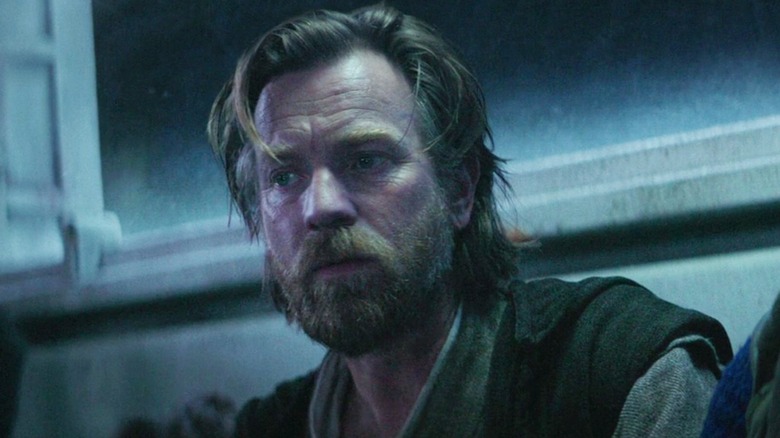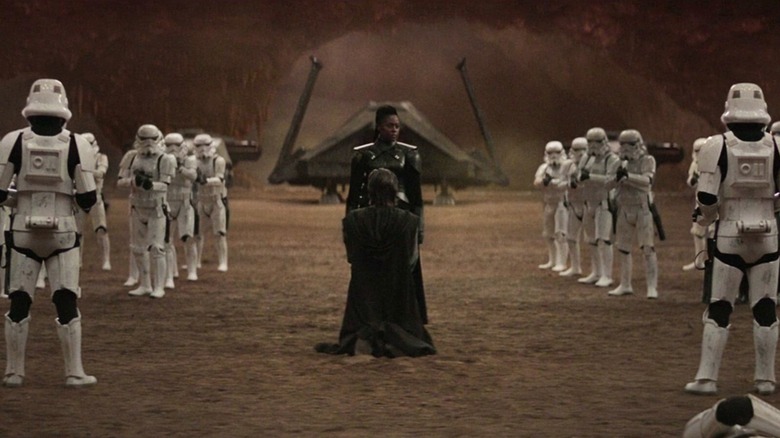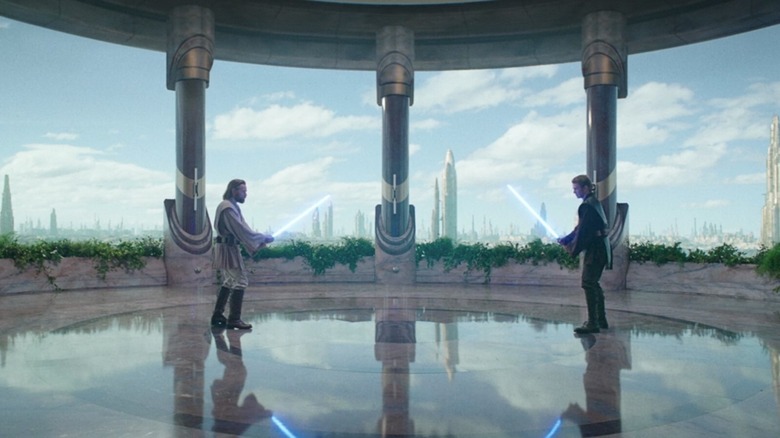The Lesson Obi-Wan Kenobi Borrows From Star Wars: The Last Jedi
This post contains spoilers for the latest episode of "Obi-Wan Kenobi."
The penultimate episode of "Obi-Wan Kenobi" has already stirred up quite a bit of buzz with its opening flashback of a younger Obi-Wan (Ewan McGregor) and Anakin Skywalker (Hayden Christensen) during the prequel era of "Star Wars," and rightfully so. In a welcome departure from Disney's first few productions after acquiring Lucasfilm, which seemed to avoid any and all reminders of the oft-maligned films like the plague, the "Obi-Wan Kenobi" series has thankfully kept the events of George Lucas' prequel trilogy firmly in focus. Throughout its running time, episode 5 threads snippets of both Vader and Obi-Wan's memories of one specific training duel between the two Jedi (set at some point before or during the events of "Attack of the Clones") as it relates to their ongoing conflict all these years later.
But for as much as the series and this specific episode owes to the Clone Wars period in "Star Wars" history, it's perhaps even more indebted to a rather surprising source: "The Last Jedi," which takes place decades after the events of this series.
The climactic sequence involving Obi-Wan protecting a small group of rebels in their underground hideout on Jabiim will likely bring comparisons to the final act of Rian Johnson's film, which features a very similar setup (even down to the detail of a vengeance-seeking, red lightsaber-wielding Dark Sider leading the attack). However, as noted by many, there's an even greater parallel with the remarkably similar arcs between Obi-Wan and Luke Skywalker. Between this and the reinforcing of a core tenet of the Jedi ideal — defending life, not taking it — the fingerprints of "The Last Jedi" are all over "Obi-Wan Kenobi."
Failure is the greatest teacher
Much like "The Last Jedi," which had to retroactively figure out why Mark Hamill's Luke Skywalker disappeared from the galaxy in the time between "Return of the Jedi" and "The Force Awakens," viewers came into "Obi-Wan Kenobi" knowing that much of Kenobi's time spent in exile between "Revenge of the Sith" and "Star Wars" would predominantly deal with his lingering guilt in allowing his former Padawan to fall to the Dark Side. Both Jedi Masters failed spectacularly when it came to guiding their younger protégés along the right path, and the echoes of their defeats reverberate throughout the course of the franchise.
Episode five of "Obi-Wan Kenobi," directed by Deborah Chow and written by Joby Harold and Andrew Stanton, goes out of its way to remind fans of the magnitude of Obi-Wan's mistakes. Reva (Moses Ingram) is shown to have been one of the younglings who narrowly survived Anakin's coldblooded rampage through the Jedi temple upon the implementation of Palpatine's Order 66. As much as the Inquisitor secretly plans on turning on Vader himself for his crimes, she still holds Obi-Wan personally responsible for allowing such a thing to happen in the first place — similar to Ben Solo blaming his uncle Luke in "The Last Jedi." Although Anakin (and Kylo Ren) is ultimately accountable for his own choices and his own inability to take his Master's lessons to heart, juxtaposing these flashbacks of their lightsaber duel by bringing us right back to the present, in the midst of Vader's crusade to hunt down and destroy Obi-Wan at all costs, only further emphasizes our hero's shortcomings.
Which is a good thing! Even Jedi are only human, after all. Obi-Wan coming to terms with his mistakes is why we're watching in the first place.
'See you around, kid'
Eventually, we learn exactly why we keep coming back to the events of this one training session between Obi-Wan and Anakin — a reason that feels wholly consistent with "The Last Jedi." In an effort to impart a valuable lesson, Obi-Wan takes advantage of his Padawan's innate aggressiveness and need to prove himself by besting him in their training duel. This is cleverly fed to viewers in standalone segments throughout the episode to stay relevant with their emotional journeys at specific points in the present-day storyline. By the time Anakin finds himself robbed of his weapon in the flashback, a victim of his own recklessness, Vader is left to remember this tough lesson in the aftermath of Obi-Wan sneaking the refugees away right from under his nose.
Watching this, it was tough not to think of Luke and Kylo Ren's final "duel" on Crait — a similar lesson in tough love, though with far greater stakes than Obi-Wan and Anakin's sparring session. Blinded by his rage and his fixation on his former Master, Kylo Ren doesn't even consider the possibility that Luke's arrival on Crait to buy time for the remnants of the Resistance to escape could be a trap. As Obi-Wan correctly predicts to Reva, Vader will be so focused on exacting vengeance on a captured Obi-Wan that he won't be able to remain aware of anything else going on beneath the surface.
"You grow too aggressive, Anakin. Be mindful. A Jedi's goal is to defend life, not take it." Obi-Wan's words to Anakin ring throughout the rest of the episode, neatly paralleling Luke's own actions decades later when he uses defensive powers — Force projection — to keep Kylo Ren occupied. Obi-Wan and Luke, mentor and protégé, have never felt more alike.


